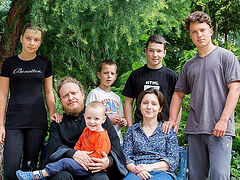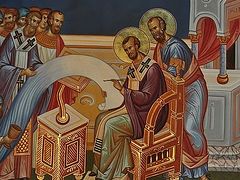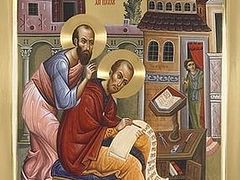You don’t need to be a child psychologist to see how many hardships modern parents have and what a deplorable state modern children are in; how messed up, aggressive and irresponsible they are; how outright disrespectful to their elders they are; how, while displaying utter indifference to masterpieces of art and literature, they avidly devour the youth subculture, which in the West is dubbed “the rock-sex-and-drugs culture”; how they sometimes absurdly combine Neanderthal ignorance with peremptoriness and aplomb; how they are preoccupied with money, financial security and the attributes of material success... But perhaps the most deplorable thing is the sense of fatality and doom that, due to the abnormalities of the younger generation, adults are seized with. They say, “Nothing can be done about it—such are the times, the circumstances and our children... We strain every nerve to provide them with a decent living. Where can we get the energy to bring them up?”
Sixteen centuries ago St. John Chrysostom instructed parents who were preoccupied with their children’s material well-being: “Many fathers often do everything in their power to enable their sons to have a good horse, a splendid house or an expensive estate, but they do not take any care at all so that he would have a good soul. This upsets the whole universe”1
Note that the great teacher of the Church was not afraid to give the issue of poor upbringing universal scope. And by no means for the sake of a witty remark! Will the universe be able to exist normally, will “life” be able to “reign” (using an expression from his Paschal sermon) if hundreds of millions of promiscuous children grow up and become dehumanized, animal-like adults?
“Thus, you should not be concerned about making your children rich in silver and gold and the like, but that they should be richer than all in piety, love of wisdom and other virtues, and that they would not need much,” he says in the same talk.
These words (as Christian ethics in general) clearly refute the current ideology of consumerism, which least of all contributes to the cultivation of virtue and is aimed at ensuring that people from the most tender age should have many needs and as they grow older they will have more and more—that is, the thirst for material blessings, pleasures and comfort should flare up so that tomorrow they would crave what they did not even think about today—and so on ad infinitum. Or, rather, till death.
But no matter what pernicious ideology dominated in this or that period of history, St. John Chrysostom argues that parents are first and foremost responsible for the upbringing of their children: “God will say: ‘Didn’t I give you your son from the very beginning? Didn't I assign you to him as a teacher, a guide, a care-giver and a leader? Didn’t I entrust you with all power over him? What excuse will you have if you ignore his disobedience? What will you say? That he is unruly and stubborn? But this should have been taken car of at the beginning, when he was capable of being restrained and very young; and you should have restrained him thoroughly, inculcating proper things in him, reforming him and punishing his mental digressions. That is why the Book of Sirach says: Hast thou children? instruct them, and bow down their neck from their youth (Sir. 7:25).’”
Further, St. John Chrysostom cites an example from the Old Testament—about Eli the priest, whom the Lord punished for insufficient strictness with his adult (!) sons. This instruction is very relevant for modern parents who are afraid of bringing up even very young children strictly because the so-called “non-directive parenting” is now in vogue.
“This priest had two sons who had given themselves over to every vice. The father did not concern himself with this and paid little attention, or if their depravity, having reached the limit, forced him to reproach them, he did it without the necessary fervor and authority. He should have punished them severely, thrown them out of his presence... But he limited himself to giving them a form of admonition… No, this demanded not an admonition, but a strong lesson, severe torments, a treatment as strong as the evil. He should have used fear to root their young hearts out of this blindness. The fathers who do not take care to give their children a Christian upbringing are murderers of their own children. Who should Eli blame for his son's death? Himself. True, the enemy’s sword slew them, but the neglect of their false father directed the blow. Abandoned by heavenly help, they appeared naked against the arrows of the Philistines. The father destroyed himself and them. Meanwhile, we see the same thing before ourselves daily. How many parents there are who do not want to take upon themselves this labor of correcting their unsubmissive and unruly children! They are as if afraid to upset their children by reigning in with stern words the vicious tendencies to which they have submitted themselves. What is the outcome? Their disorder increases; their impunity leads them to criminal offenses; they are brought to trial; and the wretches die at the hands of the executioner. You refused your personal rights over them and committed them to the severity of civil punishment, and human justice wielded its harsh rights over them. You are afraid to humiliate them with some light punishment in your presence; but what horrible dishonor shall befall you when your son is no longer around...2 Since we do not take care of our children, we expose them to great disasters and often plunge them into the abyss.”
There is nothing new under the sun! From the above quotation it becomes clear that there were supporters of “non-directive parenting” in the fourth century as well.
Judging by the following quotation, there were also such parents who, just like modern ones, declined all responsibility for bringing up their children, referring to the senselessness and futility of child raising efforts.
“Do not tell me that you cannot restrain youth… All vices come from our neglect, because we do not teach piety to our children from the very beginning or from an early age. We often allow them to attend spectacles, but we care little whether they go to church.”
Now we often hear from Orthodox parents that they are afraid to make their children go to church, saying that thus they can turn them away from church forever. But if you don't accustom your children to go to church, will they come themselves? Who knows whether they will come or not. And if they don’t come, what force in today’s reality will protect them from moral corruption?
St. John Chrysostom was especially harsh towards fathers who neglected the upbringing of their sons. It is hard to imagine what accusations he would have brought down on modern fathers!
“How dare you call yourself a father, betraying your son and disregarding him being corrupted with all vices?”
And then he gives a strong and harsh metaphor: “If you saw some runaway slave beating your child, wouldn’t you get annoyed, angry and indignant, beating the attacker more ferociously than a wild beast does? And seeing the devil strike him every day and the demons luring him into sin, you do not worry and take your son away from the most ferocious beast.”
Nowadays raising children in fear is very unpopular. They say that in no case should children be frightened by any punishment, and even more so by Divine punishment. St. John Chrysostom adhered to the opposite opinion.
“If fear were not a blessing, fathers would not appoint supervisors for their children, nor legislators—chiefs for cities. Nothing destroys sin and makes virtue grow and flourish as much as incessant fear. Therefore, if you do not live in fear, it is impossible for you to be virtuous... If fear were not good, Christ would not have given many and lengthy instructions about the punishment and torment in the afterworld. Fear is nothing but a rampart and a protection” (Talk 48 // Ibid).
I hope that these few quotes from talks by St. John Chrysostom concerning child raising show the enduring relevance of his clear, figurative, and most importantly, truthful instructions. After all, we have no idea what to do with our children because we ourselves are more entangled in various educational “innovations” than the children. So is it worth buying yet another handbook on “how to raise a child properly?” Wouldn’t it be better to get wise and read what the great father of the Church, St. John Chrysostom, said about childraising?!
St. Philaret of Moscow, who incidentally was called the “Russian Chrysostom”, had a brilliant saying: “Christ is eternal news.” The same can be said about the wondrous Holy Hierarch of Constantinople.
In conclusion, there is one more call to us, parents of the twenty-first century: “Even if our whole lives are prosperous, we will be punished severely unless we care about the salvation of our children. Children are not a random acquisition. We are responsible for their salvation” (cited from: How to Raise an Orthodox child, Moscow, 2005).





